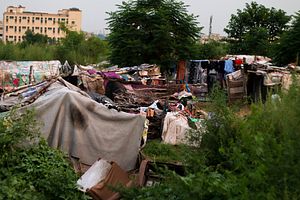ISLAMABAD, Pakistan — Four-year-old Surraiya has big dreams. “I want to become a doctor,” she says with a smile, as she attends school in one of Islamabad’s irregular settlements — a katchi abadi. She and the other students work in the daytime and in the evening sit on mats and a handful of chairs under an open sky to learn.
In March, Pakistani Prime Minister Imran Khan said that his government would build some 5 million houses for the poor. It was to be one of his government’s top priority schemes. Khan vowed to start the effort in April. So far not much can be seen on the ground.
Pakistan’s capital is known for its posh bungalows and trendy cafes, a place for the country’s wealthy and politically connected to mingle. But there is another side of the city as well.
This katchi abadi, the local term for an irregular settlement, is in the G-11 sector of the city, and one of around 50 in Islamabad. The parents of children like Surraiya are domestic workers, most of the mothers are maids. They live there with no basic services.
There is no plumbing for water, no electricity or paved roads. Makeshift houses are made from bamboos, tarpaulin and tin sheets surrounded by bushes and hidden by trees; separated, the katchi abadi stand just a stone’s throw from posh bungalows.
These settlements are found across the country, and have existed in Islamabad for three to four decades. In other places, they have transformed over the decades – from tent homes to proper cement houses. Most of the population moved to urban centers from rural towns due to poverty, war, unemployment, urban development needs, and natural disasters. They work for the wealthy in the city, and live on informal settlements on government land. Only ten are regularized in Islamabad.
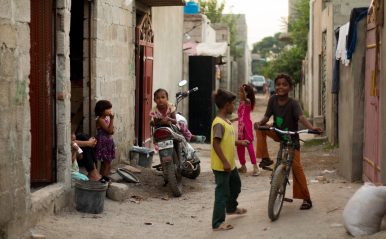
Over the decades, some katchi abidis have transformed from tent cities to proper cement houses such as this one in H-9 sector. Despite the cement houses, it is still considered an irregular settlement. Photo by Mashal Baloch.
Hope, however, blooms even in the worst of conditions and for these children it came in the form of a woman who has been working tirelessly to change their lives for the better.
Tauheed Sohail has been teaching voluntarily at the katchi abadi in the G-11 sector for more than four years. Children are unavailable in the morning as some of them work along with their parents and many stay homes taking care of their younger siblings while their mothers are out working as maids in the neighboring posh areas.
“I just wanted to teach for a while but never thought I would get attached to children,” Sohail says. “It is silly to expect the government to do everything, specially the kind of governments we have had.”
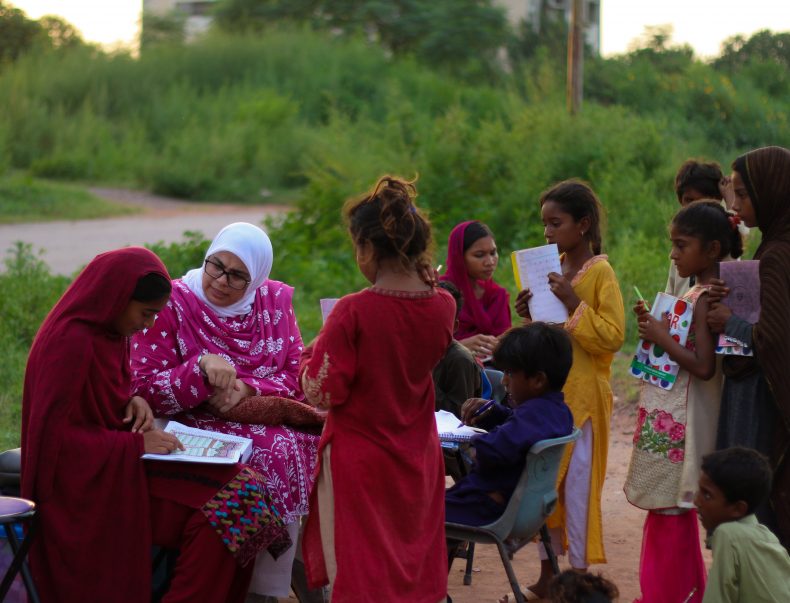
Tauhid Sohail teaches kids in a katchi abadi in Islamabad’s G-11 sector. In the evening, they sit on mats and a handful of chairs under an open sky. Photo by Mashal Baloch.
She has 57 students enrolled in nursery and kindergarten. She wants her school to be registered as a welfare trust. At first, she used to purchase the books and other materials for students herself, later her friends and family helped.
Two weeks ago, as per schedule, Sohail arrived to teach slum kids and to her surprise officials from the Capital Development Authority (CDA), the developing authority responsible for planning and the development of Islamabad, were there to inquire about the irregular settlement. Someone had complained on the citizen’s portal about the residents of this particular katchi abadi. The Citizen portal is a mobile application set up by the Khan government designed for Pakistani citizens to file queries and complaints.
Sohail talked to the CDA officials and told them not to encroach on the area, as a case has already been filed in the Supreme Court of Pakistan against the demolishing of the settlements. She said, “even I showed them the stay order of the court but they did not consider it.”
The tents were bulldozed after she left. One of the tents that was demolished belonged to Asia Bibi.
Bibi told The Diplomat, “they didn’t inform us about the evacuation.” Bibi works as a maid. She came to Islamabad as an economic migrant in search of a job. She does not possess any documents of ownership like other dwellers.
“We will move to another place if they bulldoze us again,” she added.
Back in January 2014, a petition was filed by Amin Khan, resident of the G-11 katchi abadi in Islamabad against the Federation of Pakistan and the National Database and Registration Authority (NADRA) before the Islamabad High Court, requesting the issuance of a computerized national identity card (CNIC) to the petitioner Amin Khan. Instead of addressing the contentions raised by the petitioner, the judge presiding over the matter directed the Ministry of Interior to explain how katchi abadis were allowed to emerge in different parts of Islamabad and asked for their evacuation.
As the gap between rich and poor widens, the katchi abadis grow. People move to Pakistan’s urban centers in search of employment but many move to katchi abadis, located on government land, to avoid unaffordable city rents.
Some 23,000 families lived in the I-11 sector of Islamabad that was said to be one of the biggest katchi abadis; it was demolished in 2015 by the CDA. Today the site offers a different view. Huge buildings are replacing the mud houses; the rich replacing the poor.
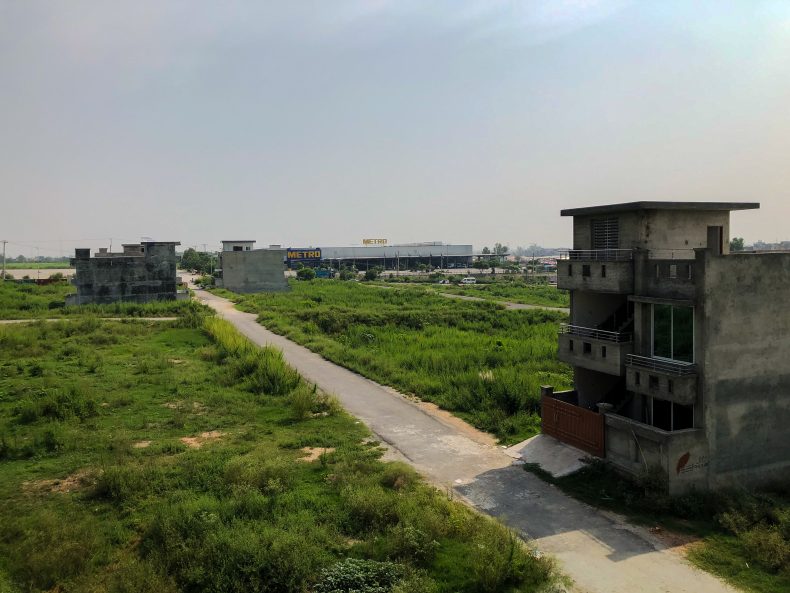
Once the site of the I-11 katchi abadi, the mud houses were demolished and a few buildings put up. Photo by Mashal Baloch.
“It was midnight when shelling and tear gases were fired at us for evacuation” said Nasir Khan, “we faced worse treatment than Indian-administered Kashmiris.”
Khan’s family moved to Islamabad about 35 years ago from Mohmand Agency in Khyber Pakhtunkhwa for economic reasons. Since then he has sold fruits in a market that is near his previous residence in the former katchi abadi. Now he lives 12 kilometers (7.4 miles) from the market.
After the eviction and demolition, Khan, activists and political workers of the Awami Workers Party (AWP) submitted a petition to Pakistan’s apex court.
“Actually, the land had belonged to the government and CDA,” says Khan. “Everyone had to pay a respective amount of money as a bribe to lower officials at CDA to reside there.”
Along with his family, Khan lived there along with 40 other people in a house of six rooms.
His petition asks for fundamental rights of housing and dignity, which the constitution of Pakistan already ensures. The petition reads, in part:
… Article 14 makes it clear that each and every person’s dignity and privacy of home is inviolable. It is worth noting that not only does the Constitution protect a broadened right to life, it presupposes access to a home, and protects the privacy associated with the same. Therefore, it is one of the fundamental responsibilities of the State, and possibly the most important one, to provide adequate housing and shelter facilities to the citizens and residents of Pakistan. However, this is a responsibility which the State has not only abysmally failed to fulfill, but in the case of Petitioner Nos. 4—7 (along with tens of thousands of their fellow katchi abadi residents), it is a responsibility which the State is actively and maliciously flouting at this very moment.
Pakistan is a country of the elite, where the downtrodden struggle for equal rights on daily basis.
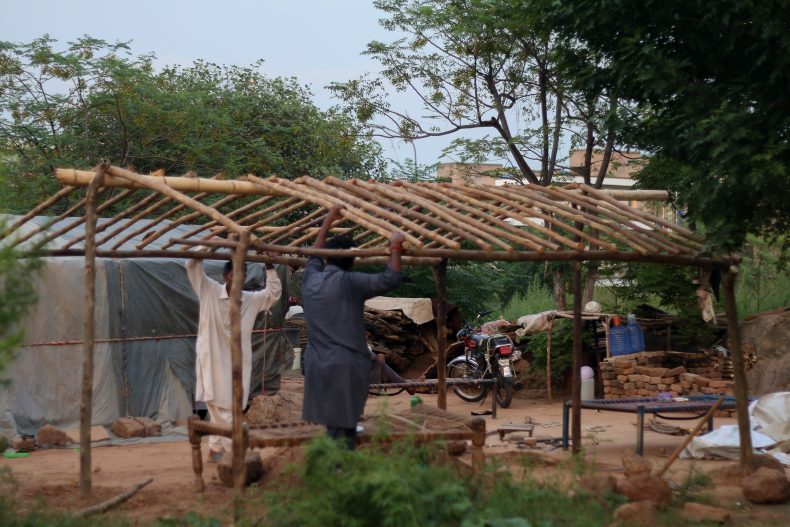
After being bulldozed by the Capital Development Authority (CDA), residents of a katchi abadi are rebuilding their makeshift houses. Photo by Mashal Baloch.
Aasim Sajjad Akhtar, an academic and president of the AWP, tells The Diplomat: “Why not form housing schemes for poor and put the bribe money, which a few officials are taking, into [the] government treasury and make their residence official? Definitely it needs a political will and revamp of all policies that benefit the elite of the countries.”
According to the director of housing in CDA, the recognition and regularization of katchi abadis depends on CDA approval, which in turn depends on central government approval.
Some questions sent by The Diplomat to the CDA were not answered, such as inquiries about allegations of lower CDA officials being involved in taking bribes from katchi abadis or questions as to why residents of katchi abadis have not been provided alternate residences prior to the demolition, as in the case of the I-11 katchi abadi.
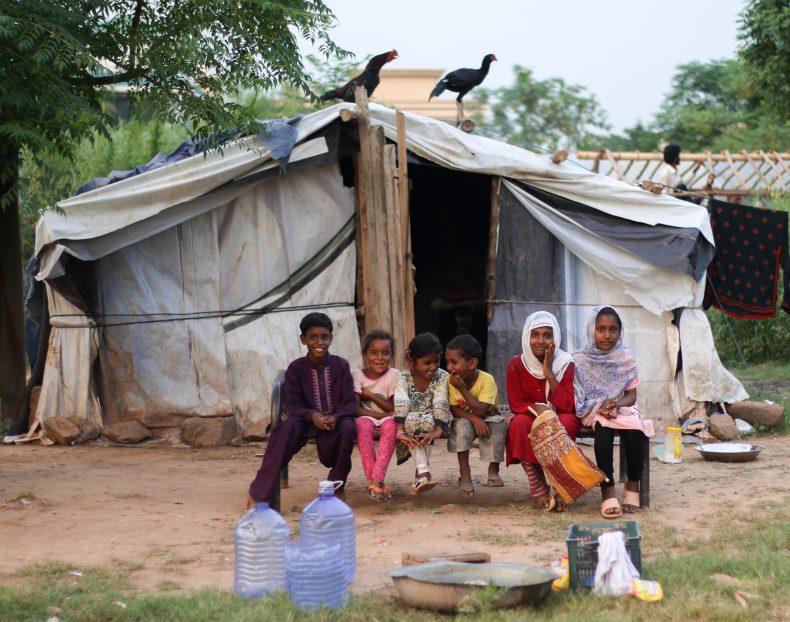
Kids sit on a charpoi in front of a makeshift house in the G-11 katchi abadi in Islamabad. Photo by Mashal Baloch.
Syed Safdar Ali, a spokesperson forwarded The Diplomat’s questions to the concerned authorities in the CDA, but nothing was heard back from the officials.
Bilal Minto, an advocate who has been fighting for the rights of Katchi abadis in Islamabad says, “katchi abadi shouldn’t be demolished until the residents are provided alternates.”
About the registered katchi abadis in the country’s capital, Minto said that these are the settlements which host most of the domestic workers in the houses of government officials and judges.
“The biggest dilemma is that neither provincial governments nor federal government takes this matter seriously. Officials think that ones who talk of downtrodden classes and their fundamental rights are just creating issues.”
Minto personally has been told he is “just wasting his time while working for poor and their housing need.”
Minto submitted a draft law which included various schemes to provide housing for the poor. For example, housing projects could be subject to a mandatory provision that they must reserve 5 percent of the housing constructed for the poor. The law would look to authorities like the Defence Housing Authority (DHA) and private operations, like the Bahria Town development, for implementation.
The solution to Islamabad’s housing problem seems to be lost in a haze of loopholes. Average Pakistani citizens can only wonder whether apathy, on the part officials, is to blame — or is it a crime to expect more?
Akhtar believes what is needed is a thorough change of policies to focus on the poor, providing basic necessities and free housing. He adds, “because [the] government and its institutions, such as the Army make housing societies for the elite to earn money. So, definitely, it needs a political revolution.”
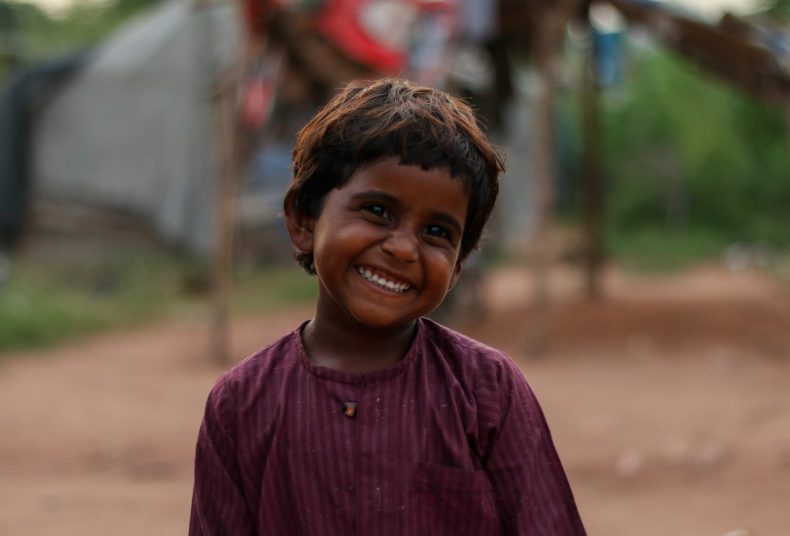
Four-year-old Surraiya has big dreams. Photo by Mashal Baloch.
Shah Meer Baloch is a journalist based in Pakistan. He has had his work published in New York Times, The Guardian, Deutsche Welle, The National, The Diplomat, Daily Dawn, Firstpost, Herald magazine, and Balochistan Times.
Mashal Baloch is a photojournalist.













